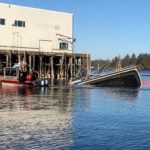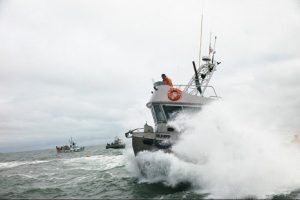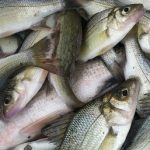Tag Archives: lobster landings
Researchers to monitor socioeconomic resilience of Maine’s lobster fishery
 A University of Maine-led research team has developed new indicators to measure the socioeconomic resilience of Maine’s lobster fishery. The study aims to deepen understanding of the industry’s challenges and guide future policies supporting the fishery and the communities it sustains. Maine’s lobster fishery, supporting thousands of jobs, is closely monitored and managed through biological surveys and industry reports. However, these statistics don’t capture the full impact of supply disruptions, market shifts and geopolitical tensions on the industry and its communities. With commercial lobster landings dropping 27 percent between 2016 and 2022, the Maine Lobstermen’s Association began exploring new ways to measure the fishery’s socioeconomic resilience, helping leaders better respond to the industry’s challenges. more, >>CLICK TO READ<< 05:53
A University of Maine-led research team has developed new indicators to measure the socioeconomic resilience of Maine’s lobster fishery. The study aims to deepen understanding of the industry’s challenges and guide future policies supporting the fishery and the communities it sustains. Maine’s lobster fishery, supporting thousands of jobs, is closely monitored and managed through biological surveys and industry reports. However, these statistics don’t capture the full impact of supply disruptions, market shifts and geopolitical tensions on the industry and its communities. With commercial lobster landings dropping 27 percent between 2016 and 2022, the Maine Lobstermen’s Association began exploring new ways to measure the fishery’s socioeconomic resilience, helping leaders better respond to the industry’s challenges. more, >>CLICK TO READ<< 05:53

A year after record-breaking catch, value of Maine lobster landings are lowest in a decade
Maine lobstermen hauled in the least valuable lobster catch in a decade last year, when a decrease in price per pound and higher operational costs gave them less incentive to get out on the water. The $389 million haul, a 47% drop from 2021’s record-shattering catch,,, The size of the haul, 98 million pounds, was nearly identical to the 10-year low hit in 2020, when lobstermen also scaled back operations, then because of the closure of traditional markets as a result of the pandemic. Kristan Porter, a lobsterman from Cutler and president of the Maine Lobstermen’s Association, laid the blame for the drop in price per pound squarely on the economy. >click to read< 11:06
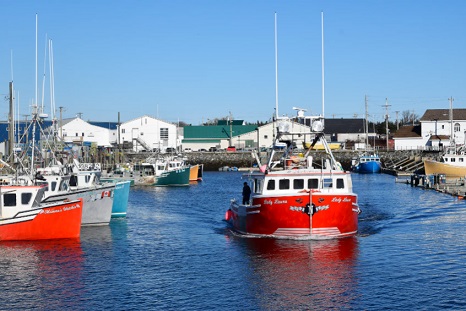
Lobster season opens with lower catches, $7 shore price
Lobster landings are estimated to be down by as much as up to 40 per cent in some areas of Lobster Fishing Area (LFA) 34 after the first week of the six-month commercial lobster fishery in southwestern Nova Scotia. “Catches are down in our area (LFA 33) 20 to 30 percent, and in LFA 34, I’m hearing they are down as low as 40 percent in some areas,” said Lockeport lobster buyer Mike Cotter, owner of Cotters Seafood Products. “Catches seem to be a little bit stronger the further you go east compared to catches in the west,” he said. The opening shore price was set at $7 a pound compared to a record-setting opening shore price last season of $11 a pound in LFAs 33 and 34 Photos, >click to read< 06:33
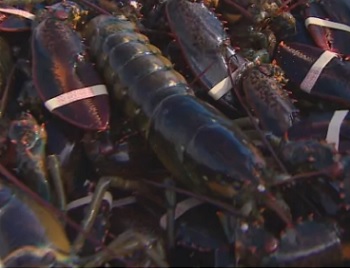
Conserving lobster stocks: Lobster landings data released by DFO show complex picture
Both Mi’kmaw fishers and people who work in the commercial fishing industry say conservation is a key concern. Some in the commercial fishing industry have pointed to declining lobster catches as evidence of potential harm to the fishery. The Bay of Fundy Inshore Fishermen’s Association has said it has concerns about the amount of lobster being landed in St. Marys Bay, which it says has declined 68 per cent since 2016. Fisheries and Oceans Canada released data showing a decline from the record highs in 2015-16. However, an examination of the 18 years of data shows a nuanced picture. >click to read< 08:10
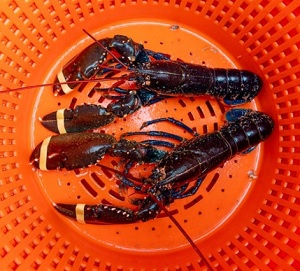
Yorkshire looks to Canada to boost fortunes of ‘Europe’s lobster capital’
Landings of lobsters into Bridlington are the largest in the UK and Europe The 310 tonnes caught last year represents 17.5 per cent of the European lobsters landed into England and 9.5 per cent of the global landings for the species.. But with the vast majority of its catch exported to France and Spain and visitors to the town eating imported Canadian lobster, its significance goes by largely unremarked. In January a group of fishing industry representatives and academics visited Shediac in New Brunswick. >click to read< 11:04
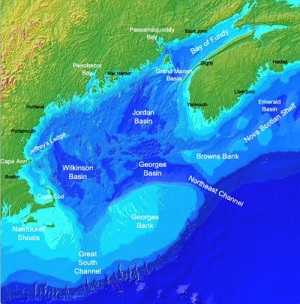
The Voice Of The Lobster
Over in the Tweetiverse, someone was all boo-hoo about the eeevil effects of “climate change” that he claimed had “already occurred”. He referenced a publication from a once-noble organization that sadly has drunk the “CLIMATE EMERGENCY” koolaid, National Geographic. So I read it, and the only thing in that, other than what “might” and “probably” and “could” occur at some uncertain time in the future, was a mention of “oceanic heatwaves” in Maine and surroundings, viz: “The U.S. is already grappling with climate change’s heavy costs, like when a powerful ocean heatwave struck the Northeast and devastated the region’s lobster fishery.” As a long-time commercial fisherman, that piqued my interest. So I looked to see what I could find out. >click to read< 05:56
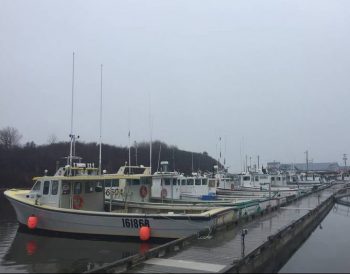
Historically high landings and uncertain prices bring a mixed bag ahead of 2019 Lobster season
The springtime lobster season in district 26a is getting ready to launch. “They’re getting the traps ready and bringing them down to the wharf,” said Wright, supervisor at the fish plant at Lismore wharf in Pictou County. “They’ll bait them on setting day, or maybe the day before and at 6 o’clock sharp the majority of them will be out on the water.” Thirty-two boats lined the floating dock at Lismore on a rainy Monday while captains and helpers attended a wharf meeting at the community centre less than a kilometre up the road. >click to read<13:28

Lobster landings post turnaround, Maine’s fisheries’ overall value second highest on record
Maine’s lobster harvesters had a strong year in 2018, landing 119.64 million pounds. That was an increase of nearly 8 million pounds over 2017’s figure of 111.9 million pounds, according to a Department of Marine Resources news release. The landings peak was in 2016, when 132.6 million pounds were harvested, after four years in the range of 122 million to 127 million pounds, according to the agency’s data. Last year was the seventh time in history that landings exceeding 110 million pounds. At $484.544 million, the value of Maine’s lobster fishery climbed by more than $46 million over 2017 on the strength of a boat price that increased from $3.92 per-pound in 2017 to $4.05 in 2018. >click to read<14:34
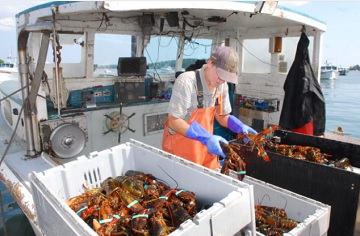
Maine lobster harvest value jumps by $46 million!
State officials say Maine fishermen caught $46 million more worth of lobster in 2018 than they did the previous year. Maine lobstermen caught 120 million pounds of lobster worth $484 million last year, the fishery’s third-highest annual total value ever, the Maine Department of Marine Resources said Friday morning. That amount is 8 million pounds more than the 112 million pounds they caught in 2017, and $46 million more than the $438 million worth that they brought ashore in Maine that same year. >click to read<14:21

Scientists say Maine’s lobster boom won’t last. Here are the fisheries coming next
In southern New England, many fishermen have turned their attention to species such as Jonah crab and black sea bass, the numbers of which have increased as ocean temperatures warm and as lobster in the region have become more scarce. Maine’s lobster landings remain near historic highs, but some say the changes that have occurred south of Cape Cod are inevitable in the Gulf of Maine. “I know it’s a hard concept to get around, but it’s going to happen,” Norbert Stamps, a Rhode Island fisherman, told a roomful of other fishermen at the Maine Fishermen’s Forum in Rockport in March. “It seems as the lobster declined [in southern New England], the crab increased. And sea bass are everywhere.” >click to read<10:43
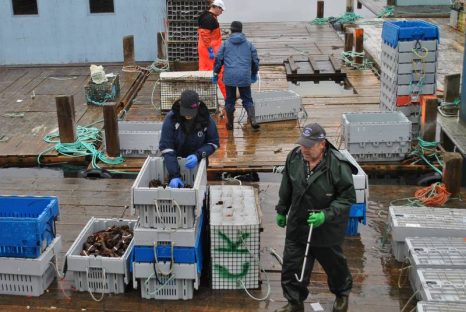
Clark’s Harbour wharf: Lobster landings looking good
It looks as though lobster landings have been holding their own for the first two weeks of the season, with estimates that the catch is on par with last year in Shelburne County. “We’re seeing about the same as last year,” said Clark’s Harbour lobster buyer Gary Blades. “Some fishermen are up, some are down.” For many fishermen the first hauling day of the season didn’t come until Nov. 30, after traps were dumped on Nov. 28. This was due to gale force winds on Nov. 29. The season opening had also been delayed by a day. After that, for the most part, the weather was cooperative. click here to read the story 14:29
Maine lobster landings, price draw concern
 Fishermen have reported catching far fewer lobsters this season than last year’s record-setting numbers. But the scarcity does not seem to have translated into much upward pressure on prices. While harvesters and dealers hold boat price information close to the vest, unofficial reports indicate that boat prices have actually dropped to $2.50 per pound or worse.,, Islesford lobsterman Bruce Fernald, part of the Cranberry Isles Fishermen’s Co-Op, said his catch is down about 20 percent this year. click here to read the story 09:19
Fishermen have reported catching far fewer lobsters this season than last year’s record-setting numbers. But the scarcity does not seem to have translated into much upward pressure on prices. While harvesters and dealers hold boat price information close to the vest, unofficial reports indicate that boat prices have actually dropped to $2.50 per pound or worse.,, Islesford lobsterman Bruce Fernald, part of the Cranberry Isles Fishermen’s Co-Op, said his catch is down about 20 percent this year. click here to read the story 09:19
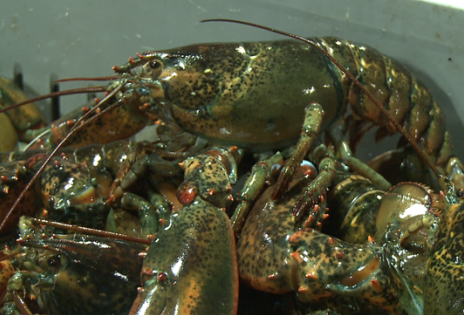
Scientists expect some decline in Gulf of Maine lobster numbers, but ‘no calamity’
Concern about the effects of climate change have reached Maine’s lobster industry, where there are questions whether the state’s record lobster catches can be sustained. There has been wide agreement among fishermen and scientists in recent years that the waters of the Gulf of Maine have been getting steadily warmer as a result of the changing climate. In fact, researchers say the Gulf water have warmed more quickly than most other parts of the ocean. University of Maine researcher Dr. Rick Wahle said warmer water in the Gulf has been one factor in the big jump in lobster landings. He said a reduction in the number of lobster predators and conservation efforts by fishermen are also factors. click here to read the story 14:53


































